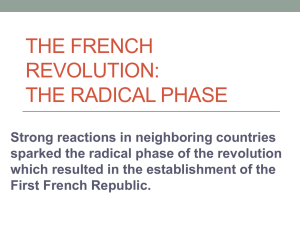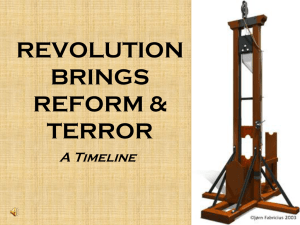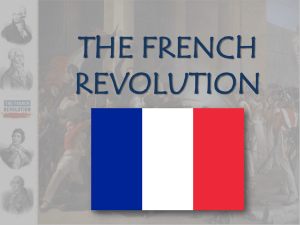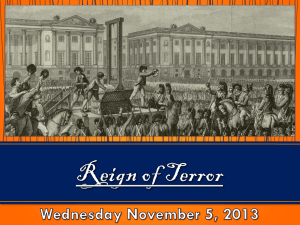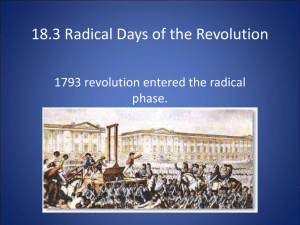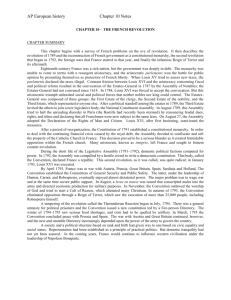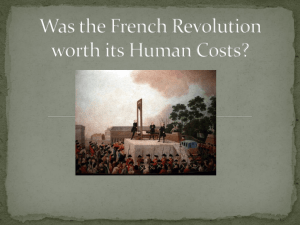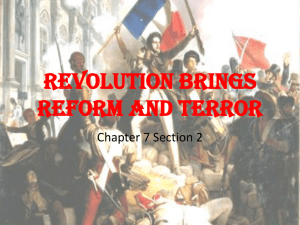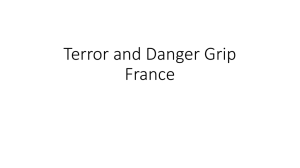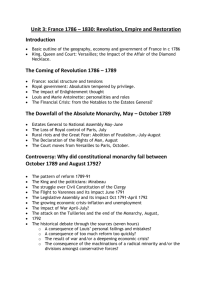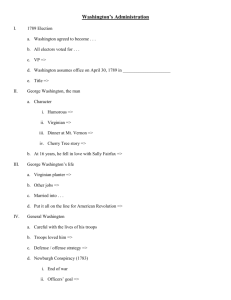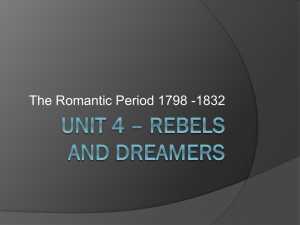The French Revolution - University of South Alabama
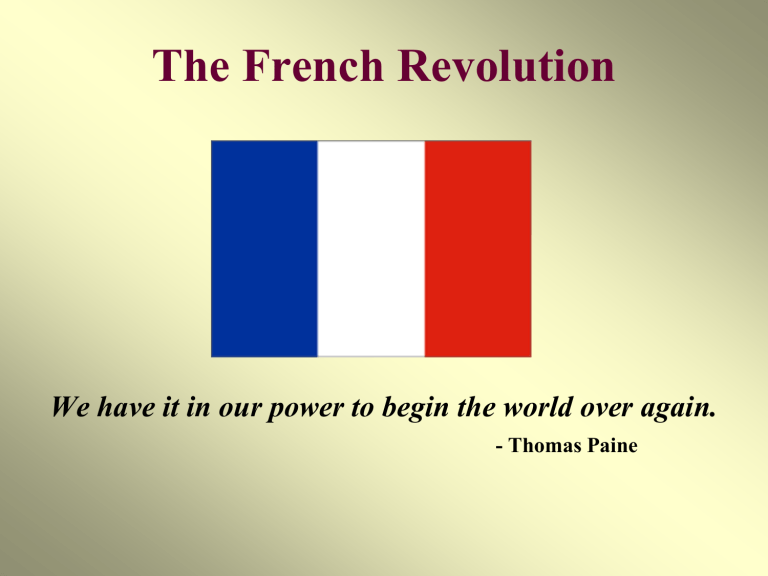
The French Revolution
We have it in our power to begin the world over again.
- Thomas Paine
Terror is the order of the day
Maximilian Robespierre d. July 28, 1794
Committee of Public Safety
Levée en masse 1793
- participatory democracy
- Law of the Maximum
- Calendrier Republicaine
- proto metric system
- education
- welfare
Reign of Terror
Guerre de Vendée
- state-sponsored terrorism
- terror as a political tool
“Terror is the order of the day”
Repudiation of the Enlightenment
I. Say you want a Revolution
Fall of the Ancien Régime
A. Absolutism
1. Louis XIV
the Colbert Report
2. Failed empire
- 7 Years War
Louis XV
- American War
Louis XVI
B. Salon revolutionaries
1. The Philosophes
1700s p rogress:
- social / political reform
2. Rational Government
Montesquieu - The Spirit of the Laws
- constitutional monarchy
- bourgeois electorate
Jean-Jacques Rousseau – The Social Contract
- democracy
- the “people” are the nation
II. First Stage
1789-1792
Extensive/Intensive revolution
A. Malthusian Crisis
1. Little Ice Age
- population, cost of living
- 1786, 1788
Antoine-Auguste Parmentier no potato for you!
B.
Après moi, le déluge
1. Double Bourbon, with a twist
Louis XVI Marie Antoinette
2 . Enlightenment turned upside down
- Alexandre de Calonne
- Pugnacious Parlements
“Madame…The difficult is done at once; the impossible takes a little longer"
C. Meeting of the Estates-General
1. the Estates-General
- clergy, nobility, commoners
- cahiers de doleances
- double representation
2. The National Assembly
June 1789
Tennis Court Oath
“not to separate, and to reassemble wherever circumstances require, until the constitution of the kingdom is established"
D. Taking it to the street…
1. Storming of the Bastille
July 14, 1789
2. National Guard
- citizen militia
Marquis de Lafayette
3. Peasant revolt
- August 1789
4. Women march on Versailles
- October 1789
INTENSIVE: people making the Revolution about themselves
5. Declaration of the Rights of Man and of the
Citizen
August 27, 1789
Sovereignty resides in the Nation (people)
All citizens are equal before the law
Religious tolerance
- Progressive tax code
Devil’s in the details
E. French Constitution of 1791
1. Constitutional monarchy
- the people are the basis of government
- unicameral legislature
- quasi-democratic / property qualifications
2. Church cedes property to state
- Patrie vs. Papacy
3. Civil rights guaranteed to minorities
- religious tolerance; ban on slavery
Vive La Revolution…
…but
Moderates wrote bourgeois Constitution
Locke, Montesquieu “Liberty”
People “radicalized” by events
Rousseau “Equality”
III. 2nd Stage
1792-1795
How far should the Revolution go?
A. Doom of the Moderates
1. Paranoia
- Emigrés
- counter-revolutionaries
2. 1st War of Coalition
1792-97
- Austria, Prussia, Britain
- war as national politics
3. The Church v. the Revolution
- September (1792) Massacres
Abbey of St. Germaine
4. Flight to Varennes
- loss of faith
June 1791
B. From Liberty to Equality
1. Sans-culottes
- anti-monarchy, anti-bourgeoisie
- universal manhood suffrage
- decentralized power
2. National Convention replaces National
Assembly
April 1792
- bad news empowered “radicals”
- the First Republic Sept. 1792
- Louis XVI put on trial, d. 1793
C. “Republic of Virtue”
1. Fall of the Girondins
- war going poorly
- economy stuck
- counterrevolution
2. The Jacobins
June 1793
- radical Social Contract
- centralized power
- universal male suffrage
Maximilian Robespierre
3. Committee of Public Safety
Levée en masse 1793
- participatory democracy
- Law of the Maximum
- Calendrier Republicaine
- proto metric system
- education
- welfare
4. Reign of Terror
Guerre de Vendée
- state-sponsored terrorism
- terror as a political tool
“Terror is the order of the day”
Repudiation of the Enlightenment
D. Limits of Radicalism
1. Rousseau, Robespierre
- women and the nation
2. Mary Wollstonecraft
Olympe de Gouges
Declaration of the Rights of Woman
and the Female Citizen 1791
IV. End of the Revolution(?)
1795-99
Counter-revolution & dictatorship
A. Revolution without end
1. Radicals turn on each other
- Jean-Paul Marat d. 1793
- Georges Danton d. 1794
“Show my head to the people. It's well worth seeing.“
2. Thermidorian Reaction
July 1794
- Robespierre d. 1794
Death of Marat (1793) by David
B. Rise of the Directory
1. Class conflict and revolution
– The Directory
1795-1799
2. End to economic revolution
- “Conspiracy of the Equals” 1796
Gracchus Babeuf
B. World reaction
1790s
1. Declaration of Pillnitz
1791
- Austria, Prussia
2. First War of Coalition
1793-97
3. Suspension of civil liberties
Great Britain 1792
U.S.
1798
4. Russia, Prussia expand their borders
